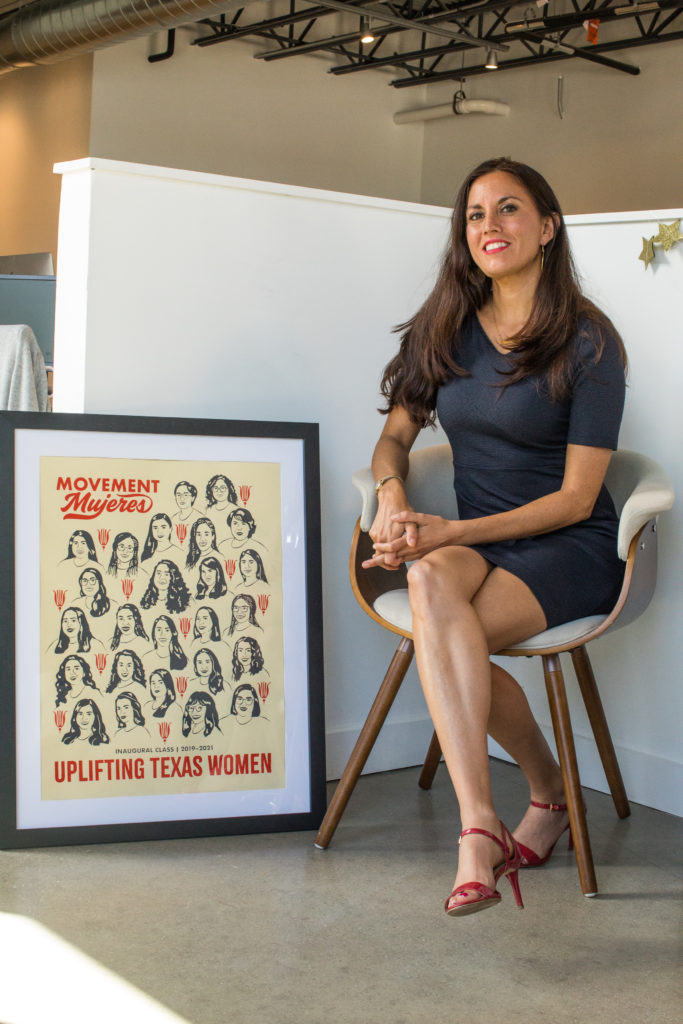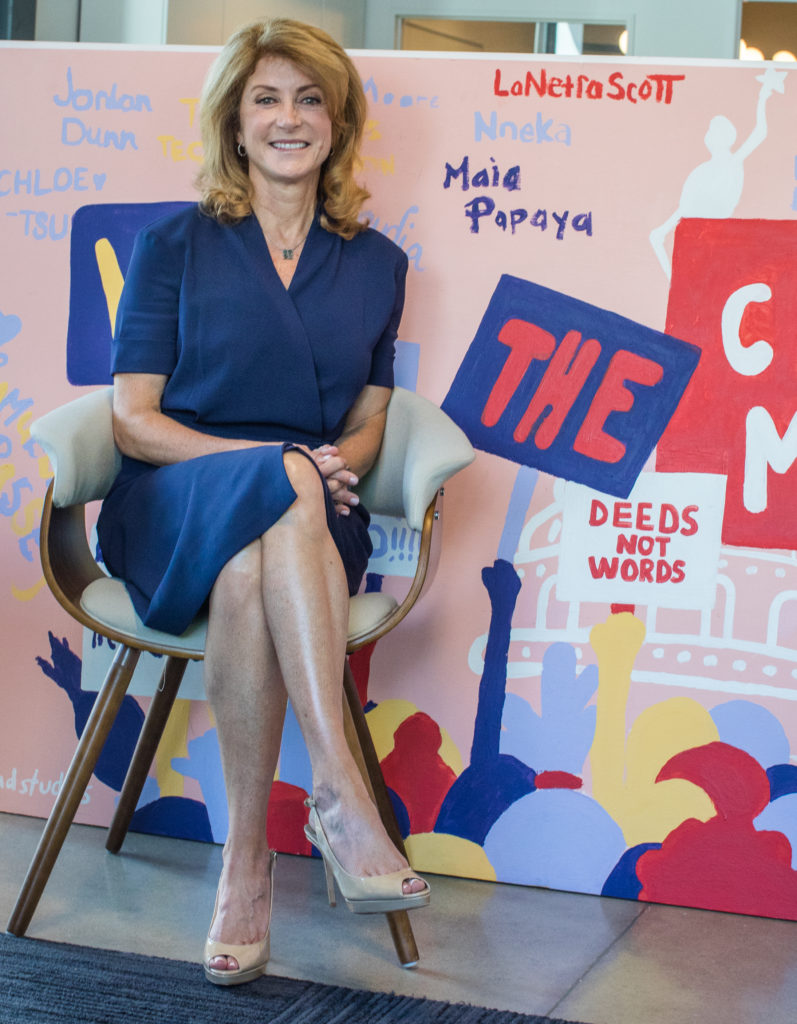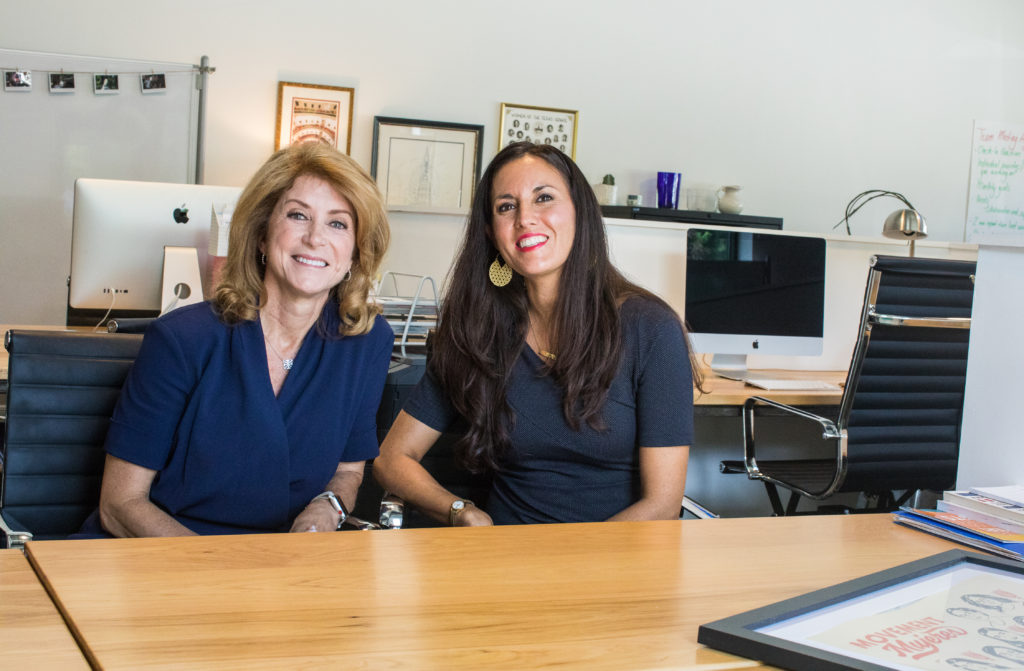Wendy Davis and Cristina Tzintzún Ramirez join forces in Movement Mujeres, an initiative to diversify Texas politics, change public policy and empower more women of color to make their voices heard.
By Jenny Hoff, Photos by Kara E. Henderson
At first glance, Wendy Davis and Cristina Tzintzún Ramirez don’t seem to like an obvious match. A former state senator representing Tarrant County, Davis gave birth to her first daughter the same year Tzintzún Ramirez was born. One woman is blond-haired and light-eyed, while the other jokingly describes herself as purebred Mexican Irish. (Tzintzún Ramirez’s mother is Mexican. Her father is white and of Irish descent.) Davis is a seasoned politician who just launched a campaign against Rep. Chip Roy, R-Austin, in the hopes of winning his congressional seat in Washington, while Tzintzún Ramirez has dedicated her career to making change at a grassroots level, spending much of the legislative session at the Capitol in Austin to keep elected officials in check.
Even the organizations that brought them together have opposing origins: Davis started her nonprofit, Deeds Not Words, in March 2016 to help propel the progressive agenda of what she anticipated would be a Hillary Clinton presidency, whereas Tzintzún Ramirez started her organization, Jolt, in November 2016 to help build Latino political power, in part as a response to the newly elected Trump administration.
Yet one only needs to visit with Tzintzún Ramirez and Davis at the small Deeds Not Words office in a hip new warehouse-style complex in East Austin to quickly realize these two women were destined to meet. They are almost like two sides of the same coin. Both the activist and politician were raised by moms who grew up in poverty, came from large families (nine or more siblings) and never completed high school. Both women also individually credit their fathers’ influence for pursuing their passions versus paychecks. And both are constantly traversing the state, fighting to change the demographic makeup of the Texas Legislature, whether from the inside or the outside.
“When we don’t have the diversity of ideas and representation in government, we don’t get the diverse solutions we need,” says Tzintzún Ramirez, laying out the demographic makeup of the state versus that of the Texas Legislature.
Between the two chambers in the state Capitol, there are currently 136 male and 42 female legislators, even though women comprise slightly more than half of the Texas population (50.4 percent, according to 2010 census data). And while Texas is a majority-minority state with 58 percent of residents identifying as nonwhite, only 36 percent of state lawmakers are people of color.

“When people think of Texas, they think of a majority of cowboys,” Tzintzún Ramirez says. “But actually, what they should be imagining is a state that is young, brown and black. That is who Texas is.”
While Tzintzún Ramirez was named by Southern Living magazine as a New Hero of Civil Rights and regularly marches on the Capitol in support of women and immigrants, Davis gained national recognition as a politician on the rise after she donned pink sneakers and stood for 11 hours straight on the Senate floor, hoping to thwart passage of an abortion bill she felt would restrict women’s rights.
In short, they are women on the move, which makes the organization they founded together, Movement Mujeres, a fitting choice for their first collaboration.
“Because we don’t have that diversity of representation in every level of policymaking, what we see are that women are on the receiving end of hostile legislation,” Davis says. “Until we have women at the table, they’ll continue to be on the menu.”
The purpose of Movement Mujeres is to help young women of color who hold values most often associated with the Democratic Party and have demonstrated leadership potential to become more active players in social and policy change, both within government and as a part of philanthropic organizations. Every two years, Movement Mujeres leads will choose 25 fellows whose duties will include meeting quarterly in cities throughout the state. They will learn skills such as fundraising, networking and producing op-eds from journalists and current state leaders. They will then be matched with other successful women of color, who will act as mentors as they forge their paths in the public-policy sector. The aim of Movement Mujeres is to give the fellows the network and fundraising abilities they need to pursue roles they may have previously thought were out of reach.
“We are hoping to provide young women with the confidence and the tools and skills to show up and be successful when they try out for the team,” Davis says.
One woman who plans to be in the game is current Movement Mujeres fellow Erika Ramirez, who finished her Master of Public Administration degree at George Washington University and came back to Texas after the 2016 election, determined to concentrate on helping her own community first.
“You’re never going to learn if
CRISTINA TZINTZÚN RAMIREZ
you’re cut out for something
until you just do it.”
“I was going to start on my own work as being an advocate for women’s health for the legislative session,” she says. “Then I saw this opportunity and I realized it was geared toward women exactly like me. I’m especially excited to find a mentor who can help guide me to the right path.”
Ramirez is part of the first cohort of fellows chosen after a brief call for applications at the end of 2018. Even though the fellowship opportunity was announced near the holidays and came with only a short window to apply, Davis and Tzintzún Ramirez were surprised to receive almost 250 applications from women throughout the state who were already active in their communities and ready to take the next step as leaders. The chosen fellows were announced in February, right in the thick of the 2019 legislative session, giving the women the opportunity to jump right in to advocacy and policy discussions, and showing them that whatever path they choose, they can be a part of shaping Texas.
“Running for office is something I would consider,” Ramirez says. “Or I may want to start my own nonprofit that focuses on women of color in the health space.”
Davis says she wants to show the fellows that change isn’t as impossible as it seems. After all, she’s living proof. When she won her state Senate seat in 2008, she turned a longtime Republican stronghold blue. However, change also takes grit. Even though she lost in her 2014 bid for Texas governor by more than 20 points, despite national recognition and an enthusiastic fan base, she’s ready to show getting knocked down doesn’t mean you’re out of the game. While she admits she doesn’t have another statewide race in her at the moment (she’s letting fellow Democrats challenge Republican senator John Cornyn in 2020), she does believe she has a chance to win, even though the 21st Congressional District, represented by Roy, has been red for the past several decades.
“Beto [O’Rourke] got 49.9 percent of the vote in this district,” she says. “I think we’re positioned to tip it over the edge.”
While she may have been out of the political headlines for the last couple years, Davis has been working with her Deeds Not Words team, as well as with Tzintzún Ramirez, to influence legislation in Austin. During the last legislative session, Davis and Tzintzún Ramirez both helped write and push for bills related to women’s issues, including those involving sexual harassment, sexual assault and maternal mortality, as well as broader issues that especially affect low-income communities, such as student debt and voting rights. Ultimately, their teams helped pass more than 18 bills into law, including SB 37, which reversed a law that allowed the state to ban professional license holders, like teachers and nurses, from renewing their licenses if they were in default on their student loans. Davis and Tzintzún Ramirez’s teams argued the law disproportionally punished women, who are more likely to work in industries requiring these licenses.

“All of our fellows ended up leading groups, and we brought them all to the Capitol, 200 young women, for a Movement Mujeres advocacy day and really advocated for these bills,” Tzintzún Ramirez says. “You’re never going to learn if you’re cut out for something until you just do it.”
For Tzintzún Ramirez, it was a lesson she learned at 24 years old, when she became the executive director of Workers Defense Project, an initiative she co-founded at 21 while still a full-time student.
“In the first two years, I nearly failed,” she recalls. “I remember calling my mom and telling her I wasn’t cut out for it, that I wasn’t meant to be a leader. She told me, ‘Cristina, no llores—don’t cry—and more importantly, don’t doubt yourself. You were born to do this.’ ”
Under Tzintzún Ramirez’s leadership, WDP went from a small, two-person volunteer organization to a nonprofot with 30 staff members hailed by The New York Times as “one of the nation’s most creative organizations for immigrant workers.”
Tzintzún Ramirez and Davis are now putting that energy into prepping the next generation of female Democratic leaders, hoping to pass the torch of advocacy and policymaking to women who, at first glance, may have thought they didn’t look the part to play a role in forging the future of their state.
What Tzintzún Ramirez and Davis have seen so far gives them hope that their mission will be a success.
“I think Texans are on the front lines of every major issue our country is facing,” Tzintzún Ramirez says. “But I also see a generation of bold young women of color in the state who are ready to make a difference.”
Since publication of this story, Cristina Tzintzun Ramirez announced she’s running for U.S. Senate.
HOW TO GET INVOLVED
Not everyone can qualify for a Movement Mujeres fellowship, but that doesn’t mean every Texan can’t contribute to making this state a better place for all. Wendy Davis and Cristina Tzintzún Ramirez offer up their suggestions for identifying the tools any woman needs to get into politics.
1. Find an issue you care about and get involved with advocacy groups working for that cause. “We find our ways into effective advocacy when we follow a passion that we have,” Davis says. “I think it’s artificial to put wanting to be an office holder ahead of wanting to make change on something.”
2. Find a mentor. “If you want to try to do something, go and find a mentor who has already done it and learn from them,” Tzintzún Ramirez says.
3. Look for groups supporting women who want to be involved in policy. “Outside of what we’re doing with Movement Mujeres, there [are] organizations dedicated to helping all women who are thinking about running for political office [to] crystallize whether that’s something that is right for them,” Davis says.
4. Believe in yourself and take action. “I don’t think you need to have any specialized training,” Tzintzún Ramirez says. “If you see something that is not being done in your community, I think the most important thing to do is not wait for someone else to respond or believe that someone else will respond yourself.”
MOVEMENT MUJERES AT A GLANCE
- Movement Mujeres is a joint initiative through nonprofits Deed Not Words, a women’s advocacy group started by former state senator Wendy Davis, and Jolt, a nonprofit dedicated to building the leadership capacity of millennial Latinos in the policy space. The goal is to get more women of color into policy discussions and creation through developing mentorship opportunities, introducing them to state leaders and helping them create their own organizations within their communities.
- The fellowship is open to Texas women of color between the ages of 21 and 35. The first fellowship group was announced in February and those selected represent more than 14 cities in Texas. All fellows have demonstrated leadership potential through previous work, a belief in progressive values and a dedication to creating change.
- Movement Mujeres offers fellows a modest stipend to continue their leadership work in their communities, covers travel costs for fellowship-related events and offers funding for child care if needed.
- Movement Mujeres received a $2 million grant from the NoVo Foundation to fund its fellowship.


